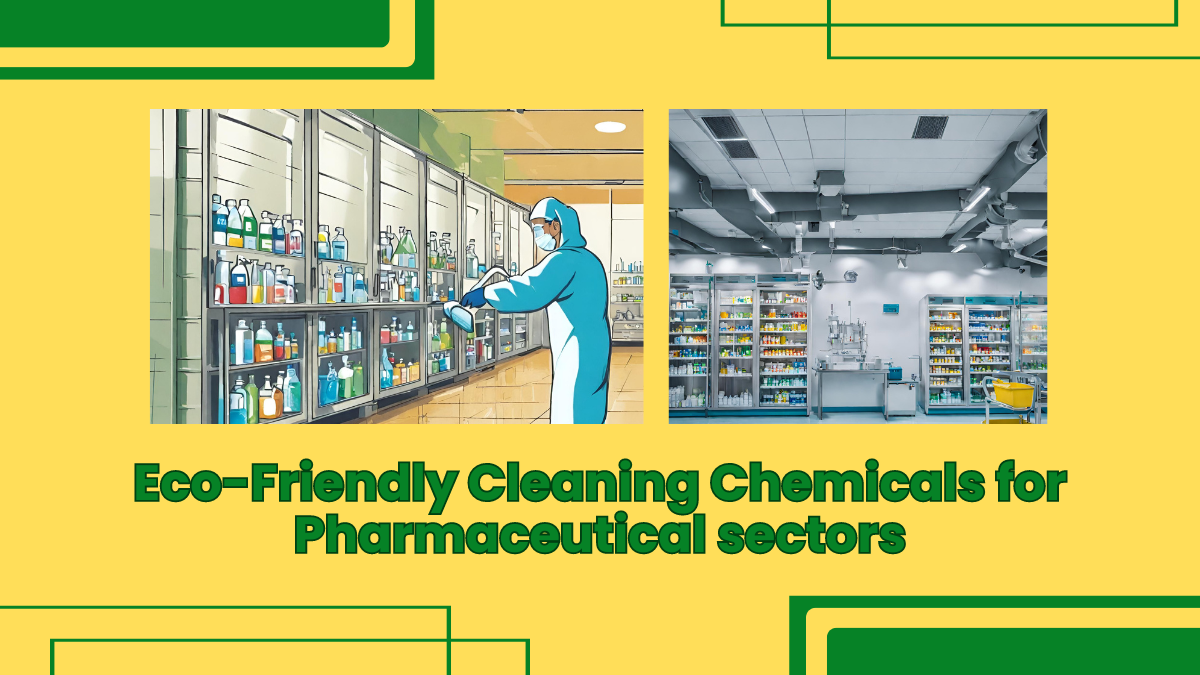Introduction to Eco-Friendly Cleaning Chemicals for Pharmaceutical sectors
In recent years, there has been a growing emphasis on sustainability across various industries, including pharmaceuticals. One significant aspect of this movement is the adoption of Eco-Friendly Cleaning Chemicals for Pharmaceutical sectors. These chemicals play a crucial role in maintaining cleanliness and hygiene in pharmaceutical facilities while minimizing environmental impact. Understanding the Need for Sustainable Solutions is very important The pharmaceutical sector is known for its rigorous cleanliness standards due to the sensitive nature of its operations. However, traditional cleaning chemicals often contain harmful substances that can pose risks to both the environment and human health. As awareness of environmental issues continues to rise, there is a pressing need for more sustainable alternatives.
Benefits of Eco-Friendly Cleaning Chemicals for Pharmaceutical sectors
Environmental Impact
Eco-friendly cleaning chemicals are formulated using biodegradable ingredients that break down harmlessly in the environment. This reduces pollution and minimizes the carbon footprint associated with pharmaceutical manufacturing.
Health Benefits
Traditional cleaning chemicals often contain toxic compounds that can contribute to respiratory problems and other health issues among workers. Eco-friendly alternatives are safer to handle and reduce the risk of exposure to harmful substances.
Challenges in Implementing Eco-Friendly Solutions
Despite their numerous benefits, the widespread adoption of eco-friendly cleaning chemicals faces several challenges. One of the primary obstacles is the perception that these products may be less effective than their conventional counterparts. Additionally, transitioning to eco-friendly solutions may require initial investment in new equipment and training.
Innovations in Eco-Friendly Cleaning Chemicals
To address these challenges, researchers and manufacturers are constantly developing innovative solutions in the field of eco-friendly cleaning chemicals. This includes the use of biodegradable ingredients derived from renewable sources and the implementation of energy-efficient production processes.
Regulations and Standards in the Pharmaceutical Sector
Regulatory agencies around the world have established strict guidelines for the use of cleaning chemicals in pharmaceutical facilities. Companies must ensure compliance with these regulations while also prioritizing sustainability and environmental responsibility.
Products for Eco-Friendly Cleaning Chemicals for Pharmaceutical sectors
We will get to know about the products we can use for these sectors and their contribution to the environment:
Sanitize Your Hand With Eco-Grenitizer!
Ecochem understands the urban lifestyle and the need to have a quick-sanitizer always by the side. A healthy and disease-free lifestyle needs a disinfectant right at the availability to kill germs and make hands germ-free. Eco-Grenitizer is one of the premium products specially formulated for pharmaceuticals, processed industries, corporates etcetera.
Degrease The Grease With Eco-Green Kleen
The toughest Industrial degreaser is the need to cleanse stubborn greases out of the surfaces. Ecochem has Eco-Green Kleen, which is an eco-friendly chemical product in Mumbai and offers degreasing within minutes. With Eco-Friendly Cleaning Chemicals for Pharmaceutical sectors it helps in cleaninh tough stains, Most of the available tough cleansers contain harsh chemicals that cause enough pollution in the atmosphere and also may lead to an adverse effect on the users with its unique feature of being a water-based formulation.
Make Air Green with Green Air!
Making of odors is not a solution when it comes to Air Fresheners. EcoChem with a thought to unmask the foul smells with Eco-Green Air which is one among the best bio-based products for multi-purpose air fresheners. The chemical-based air fresheners that are available in the market create a coating on the nasal membrane and insists the brain think that the foul smell is gone.
Impact of Eco-Friendly Cleaning Chemicals for Pharmaceutical sectors
As the demand for eco-friendly solutions continues to grow, the future of cleaning chemicals in the pharmaceutical sector looks promising. Eco-Friendly Cleaning Chemicals for Pharmaceutical sectors helps as Innovations in technology and increased awareness of environmental issues are driving the development of more sustainable practices:
Environmental Preservation:
The adoption of eco-friendly cleaning chemicals reduces the pharmaceutical sector’s carbon footprint by minimizing pollution and conserving natural resources.
Healthier Work Environments:
By replacing toxic cleaning chemicals with safer, eco-friendly alternatives, pharmaceutical companies can create healthier work environments for their employees.
Regulatory Compliance and Reputation:
As regulatory agencies impose stricter guidelines on environmental protection and workplace safety, pharmaceutical companies must adapt to remain compliant. Eco-Friendly Cleaning Chemicals for Pharmaceutical sectors not only ensures adherence to regulations but also enhances the company’s reputation as a socially responsible organization, attracting environmentally conscious consumers and investors.
Cost Savings and Efficiency:
While there may be an initial investment required to transition to eco-friendly cleaning chemicals, the long-term benefits far outweigh the costs. Energy-efficient production processes and reduced waste disposal expenses contribute to significant cost savings over time.
Innovation and Competitive Advantage:
The shift towards eco-friendly practices fosters innovation within the pharmaceutical sector, driving research and development of new sustainable solutions. This continuous pursuit of sustainability ensures the industry’s resilience and relevance in an increasingly eco-conscious world.
Conclusion on Eco-Friendly Cleaning Chemicals for Pharmaceutical sectors
In conclusion, the adoption of Eco-Friendly Cleaning Chemicals for Pharmaceutical sectors to achieve sustainability goals. These chemicals offer numerous benefits, including reduced environmental impact and improved health outcomes for workers. Despite challenges, ongoing innovation and regulatory support are paving the way for a more sustainable future in pharmaceutical manufacturing.
Several pharmaceutical companies have successfully transitioned to eco-friendly cleaning chemicals and achieved significant benefits. These case studies serve as examples of the feasibility and effectiveness of sustainable practices in the industry.
FAQs on Eco-Friendly Cleaning Chemicals for Pharmaceutical sectors
Are eco-friendly cleaning chemicals as effective as traditional ones?
Yes, many eco-friendly cleaning chemicals are just as effective as traditional ones, if not more so. They are formulated to meet the same rigorous cleanliness standards while minimizing environmental impact.
Do eco-friendly cleaning chemicals cost more than traditional ones?
Initially, there may be a slightly higher cost associated with eco-friendly cleaning chemicals due to factors such as research and development. However, in the long run, they can lead to cost savings through improved efficiency and reduced environmental liability.
Are there any regulations governing the use of eco-friendly cleaning chemicals in pharmaceutical facilities?
Yes, regulatory agencies have established guidelines for the use of cleaning chemicals in pharmaceutical manufacturing. Companies need to ensure compliance with these regulations while also prioritizing sustainability.
Can eco-friendly cleaning chemicals help reduce carbon emissions in the pharmaceutical sector?
Yes, eco-friendly cleaning chemicals are formulated using biodegradable ingredients and energy-efficient production processes, which can help reduce carbon emissions associated with pharmaceutical manufacturing.
What are some examples of renewable sources used in eco-friendly cleaning chemicals?
Renewable sources commonly used in eco-friendly cleaning chemicals include plant-based ingredients such as citrus extracts, cornstarch, and coconut oil.
Written by: Anshika


